Many books have been written about World War One and the events of the era, one hundred years ago, in which the war occurred. There are a number of good ones, and I have six favorites. As I see it, the best books on World War One not only tell what happened on the battlefields and in the war rooms, but also paint pictures of the characters involved and provide insights into the events that instigated the war and the motivation of the participants to engage in the battles. All six of these books meet this standard.
Going to war and being prepared to give one’s life in battle is difficult for anyone, but it was particularly difficult for American soldiers of color to fight in defense of freedoms for Europeans when they could not fully enjoy those same freedoms themselves back home. Three of these top books address this conundrum.
Finally, as a nation of immigrants, it was the case that many of the soldiers who went to battle in the “Great War” were themselves immigrants, in some cases illegals who only earned their citizenship through their battlefield service. My overall favorite WWI book, my own novel, A Place near the Front tells of the war through the eyes of one of those immigrants.
So here are my favorites, listed in the order of preference
1. A Place near the Front, by William G Herbert, 2016
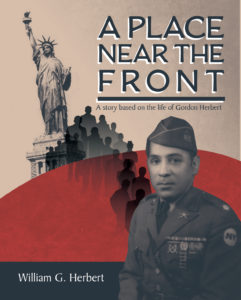 “It is an exciting novel, and it both entertains and prompts introspection and reflection upon what it means to be an American.” ~ Forward Reviews (May, 2016)
“It is an exciting novel, and it both entertains and prompts introspection and reflection upon what it means to be an American.” ~ Forward Reviews (May, 2016)
The coming-of-age story of a young, undocumented immigrant who arrives at the shores of the U.S. as a merchant seaman in the early 1900s and journeys through the streets of Harlem to the Howard University halls of learning and the trenches of World War One in search of his place in the American promised land. This book tells the story of an exciting life and an extraordinary period in history in a manner that offers insights into the seemingly intractable problems of racial discrimination, intolerance towards immigrants and the pointless brutality and devastation of war, troubling and long-standing problems we faced in the early 1900s and still face one hundred years later. The book is available from the publisher and all major online booksellers.
2. Eugene Bullard, Black Expatriate in Jazz-Age Paris, by Craig Lloyd, 2006
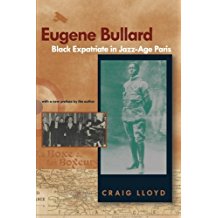 A must read for all aviation buffs who’ve ever wondered whether there was a black pilot in World War One. Although he was the first African American fighter pilot, Eugene J. Bullard is still a relative stranger in his homeland. An accomplished professional boxer, musician, club manager, and impresario of Parisian nightlife between the world wars, Bullard found in Europe a degree of respect and freedom unknown to blacks in America. There, for twenty-five years, he helped define the expatriate experience for countless other African American artists, writers, performers, and athletes. This book is available from all major online booksellers.
A must read for all aviation buffs who’ve ever wondered whether there was a black pilot in World War One. Although he was the first African American fighter pilot, Eugene J. Bullard is still a relative stranger in his homeland. An accomplished professional boxer, musician, club manager, and impresario of Parisian nightlife between the world wars, Bullard found in Europe a degree of respect and freedom unknown to blacks in America. There, for twenty-five years, he helped define the expatriate experience for countless other African American artists, writers, performers, and athletes. This book is available from all major online booksellers.
3. Scott’s Official History of the American Negro in the
World War, by Emmett J. Scott, 2015
 An extraordinary book written lovingly by a man who had been private secretary to Booker T Washington and, during World War One had served as a special adjutant to the U.S. Secretary of War. First written ninety-eight years ago (and re-released in 2015), the book employs the language and idioms of the time to describe the contributions of the black soldier in the first world war. The book is comprehensive, accurate and has an unusually exceptional collection of graphics and images. This work has been selected by scholars as being culturally important, and is part of the knowledge base of civilization as we know it.
An extraordinary book written lovingly by a man who had been private secretary to Booker T Washington and, during World War One had served as a special adjutant to the U.S. Secretary of War. First written ninety-eight years ago (and re-released in 2015), the book employs the language and idioms of the time to describe the contributions of the black soldier in the first world war. The book is comprehensive, accurate and has an unusually exceptional collection of graphics and images. This work has been selected by scholars as being culturally important, and is part of the knowledge base of civilization as we know it.
The work is now in the public domain in the United States of America, and possibly other nations. Within the United States, you may freely copy and distribute this work, as no entity (individual or corporate) has a copyright on the body of the work. The original 1919 version of the book may be downloaded (free of charge) here, while a 2015 published version is available from online booksellers.
4. The Harlem Hellfighters, by Max Brooks and Caanan White, 2014
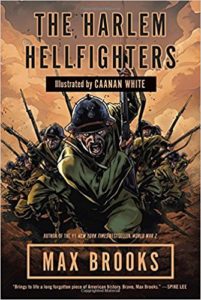 In 1919, the 369th infantry regiment marched home triumphantly from World War I. They had spent more time in combat than any other American unit, never losing a foot of ground to the enemy, or a man to capture, and winning countless decorations. Though they returned as heroes, this African American unit faced tremendous discrimination, even from their own government. The Harlem Hellfighters, as the Germans called them, fought courageously on—and off—the battlefield to make Europe, and America, safe for democracy. From the enlistment lines in Harlem to the training camp at Spartanburg, South Carolina, to the trenches in France, the authors tell the heroic story of the 369th in an action-packed and powerful tale of honor and heart.
In 1919, the 369th infantry regiment marched home triumphantly from World War I. They had spent more time in combat than any other American unit, never losing a foot of ground to the enemy, or a man to capture, and winning countless decorations. Though they returned as heroes, this African American unit faced tremendous discrimination, even from their own government. The Harlem Hellfighters, as the Germans called them, fought courageously on—and off—the battlefield to make Europe, and America, safe for democracy. From the enlistment lines in Harlem to the training camp at Spartanburg, South Carolina, to the trenches in France, the authors tell the heroic story of the 369th in an action-packed and powerful tale of honor and heart.
5. Paths of Glory, by Humphrey Cobb, 2010
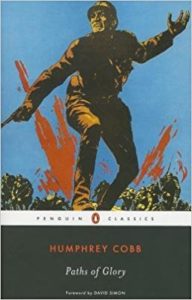 Familiar to many as the Stanley Kubrick film starring Kirk Douglas, Paths of Glory explores the perilous complications involved in what nations demand of their soldiers in wartime. Humphrey Cobb’s protagonists are Frenchmen during the First World War whose nightmare in the trenches takes a new and terrible turn when they are ordered to assault a German position deemed all but invulnerable. When the attack fails, an inquiry into allegations of cowardice indicts a small handful of lower-ranked scapegoats whose trial exposes the farce of ordering ordinary men to risk their lives in an impossible cause. A profoundly chilling portrait of injustice, this great novel offers insight into the tragedies of war in any age. This book was written in 1935 and was republished in 2010, It is available from major online booksellers.
Familiar to many as the Stanley Kubrick film starring Kirk Douglas, Paths of Glory explores the perilous complications involved in what nations demand of their soldiers in wartime. Humphrey Cobb’s protagonists are Frenchmen during the First World War whose nightmare in the trenches takes a new and terrible turn when they are ordered to assault a German position deemed all but invulnerable. When the attack fails, an inquiry into allegations of cowardice indicts a small handful of lower-ranked scapegoats whose trial exposes the farce of ordering ordinary men to risk their lives in an impossible cause. A profoundly chilling portrait of injustice, this great novel offers insight into the tragedies of war in any age. This book was written in 1935 and was republished in 2010, It is available from major online booksellers.
6. All Quiet on the Western Front, by Erich Maria Remarque, 1987
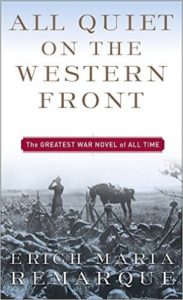 This powerful story describes the German soldiers’ extreme physical and mental stress during the war, and the detachment from civilian life felt by many of these soldiers upon returning home from the front. The author, himself a veteran of World War One, wrote the book in 1928. At its beginning he says “This book is to be neither an accusation nor a confession, and least of all an adventure, for death is not an adventure to those who stand face to face with it. It will try simply to tell of a generation of men who, even though they may have escaped (its) shells, were destroyed by the war.” The book does not focus on heroic stories of bravery, but rather gives a view of the conditions in which the soldiers find themselves. The monotony between battles, the constant threat of artillery fire and bombardments, the struggle to find food, the lack of training of young recruits (meaning lower chances of survival), and the overarching role of random chance in the lives and deaths of the soldiers are described in detail. The book is available from all online booksellers.
This powerful story describes the German soldiers’ extreme physical and mental stress during the war, and the detachment from civilian life felt by many of these soldiers upon returning home from the front. The author, himself a veteran of World War One, wrote the book in 1928. At its beginning he says “This book is to be neither an accusation nor a confession, and least of all an adventure, for death is not an adventure to those who stand face to face with it. It will try simply to tell of a generation of men who, even though they may have escaped (its) shells, were destroyed by the war.” The book does not focus on heroic stories of bravery, but rather gives a view of the conditions in which the soldiers find themselves. The monotony between battles, the constant threat of artillery fire and bombardments, the struggle to find food, the lack of training of young recruits (meaning lower chances of survival), and the overarching role of random chance in the lives and deaths of the soldiers are described in detail. The book is available from all online booksellers.